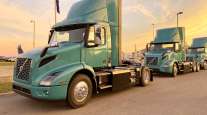Senior Reporter
CARB Formally Adopts Low-NOx Omnibus Rule

[Stay on top of transportation news: Get TTNews in your inbox.]
California regulators have unanimously approved a sweeping regulation that will lower oxides of nitrogen and particulate matter emissions for new trucks built beginning in 2024.
The California Air Resources Board adopted the new regulation, which will reduce NOx emissions by 90%, after a daylong public hearing Aug. 27. The new rule drew support from state air quality officials nationwide, but was opposed by some trucking industry trade groups such as American Trucking Associations, the California Trucking Association and the Truck and Engine Manufacturers Association (EMA).
The new regulation reduces the current heavy-truck NOx standard from 0.20 grams per brake horsepower hour to 0.050 g/bhp-hr from 2024 to 2026, and to 0.020 g/bhp-hr in 2027.
California adopts new regulation that will further ⬇ #smog forming pollution from heavy-duty diesel trucks by requiring NOx reductions. This is vital to #publichealth and the communities hit hardest with heavy truck traffic.
https://t.co/BpbHT060vs#airquality #cleantrucks pic.twitter.com/7ulu0FRzxn — CARB (@AirResources) August 28, 2020
In addition, it will reduce heavy-truck particulate matter emissions from its current emission standard of 0.01 g/bhp-hr to a standard of 0.005 for 2024 and subsequent model-year engines.
CARB officials said the measure is critical for attaining federal health-based air quality standards for ozone in 2031 in the South Coast and San Joaquin Valley air basins, and fine particulate matter standards over the next decade. Board members continued to lament that California has the dirtiest air in the nation.
The emissions-reduction plan, formally known as the Heavy-Duty Engine and Vehicle Omnibus Regulation, also is intended to maintain a low-NOx requirement for diesel trucks as CARB gradually transitions to all zero-reduction trucks by 2045.
Board members rejected a staff proposal alternative to turn the CARB standard into a 50-state plan, asserting they would wait for the U.S. Environmental Protection Agency to come up with a national NOx reduction rule, expected to go into effect in 2027.
Board considers multi-pronged regulation to further ⬇ smog-forming NOx emissions from heavy-duty diesel trucks
https://t.co/yqRra5jqq0
https://t.co/IUII7dcBup#cleantrucks #airquality pic.twitter.com/WyeUGwfyd6 — CARB (@AirResources) August 27, 2020
The board temporarily sidelined a plan to give credits to manufacturers who sell zero-emission heavy trucks prior to 2024, when an earlier regulation approved by the board will require truck manufacturers to begin selling a percentage of their new trucks as electric. The board asked the CARB staff to revisit the credit provision that several public commenters said would fail to help the state transition from diesel to electric heavy trucks.
Even with the expected emission reductions, on-road heavy-duty vehicles are projected to remain one of the largest contributors to the state’s NOx emissions inventory, CARB officials said.
A large majority of the 50-plus commenters supporting the rule included state air quality officials from Connecticut to Oregon, some of whom indicated they might adopt the rule for their own states.
Other supporters included environmental groups and the Manufacturers of Emission Controls Association.
“MECA supports the Omnibus’ regulatory flexibility offered in the first phase of implementation until 2026 to allow the industry to gain experience and prepare for the second phase requirement that begins in 2027,” MECA Deputy Director Michael Geller said.

Tunnell
Mike Tunnell, ATA’s California-based director of environmental affairs and research, said that because heavy trucks are critical suppliers of goods to the nation, it is important that ensuring dependability is a major focus of the NOx emissions rule.
“Testing two engines in a laboratory does not ensure dependability,” Tunnell told the board. “The combination of a short lead time, and the closing of labs and testing facilities due to COVID, will result in a very complex product being rushed to market without time for adequate testing and troubleshooting.”
Tunnell added, “As a result, product quality to the end user will suffer. Apprehension will prevail, and the desired results will not be achieved. Instead like many others, including the Truck Dealers Alliance, we are asking you to refocus this effort on a collaborative national approach targeting 2027.”
Chris Shimoda, vice president of government affairs for CTA, agreed with ATA.
Laurie Holmes, senior director of environmental policy for the Motor and Equipment Manufacturers Association, said her organization supports the rule.

Natural gas and propane join electric power as alternatives to diesel. Host Seth Clevenger talks with Chad Lindholm of Clean Energy and Stuart Weidie of Alliance Autogas. Hear a snippet, above, and get the full program by going to RoadSigns.TTNews.com.
“These standards have been proven feasible and will promote the best available cost-effective emissions reduction technologies,” Holmes said.
Jed Mandel, president of EMA, said his organization strongly opposes the regulation.
“We have submitted extensive detail, data-driven and science-based technical comments on the rule, supported by the work of third-party independent experts in opposition to the proposal,” Mandel told the board. “In short, the rule is not technically sound or cost-effective, and the rule fails to provide the legally mandated minimum lead time. If implemented, the rule will not achieve its air quality goals, and it will harm California’s economy.”
Dave Cooke, senior vehicle analyst in the Clean Vehicles Program for the Union of Concerned Scientists, said his group supports the low-NOx rule, but that the rule can be further strengthened.
“The baseline requirements of [the electric truck rule] are going to generate credits that are then used to let diesel trucks off the hook, and pollute more,” Cooke told the board. “This is unacceptable.”
Want more news? Listen to today's daily briefing:
Subscribe: Apple Podcasts | Spotify | Amazon Alexa | Google Assistant | More




